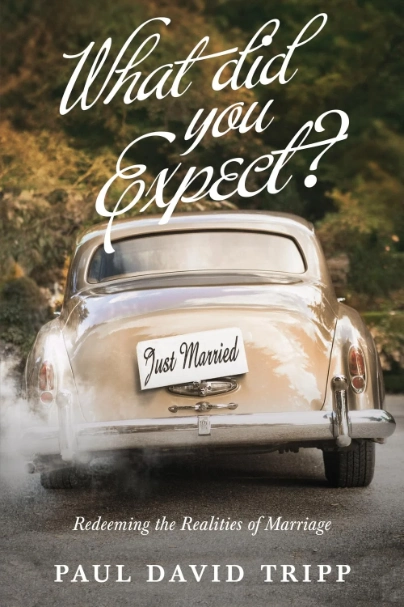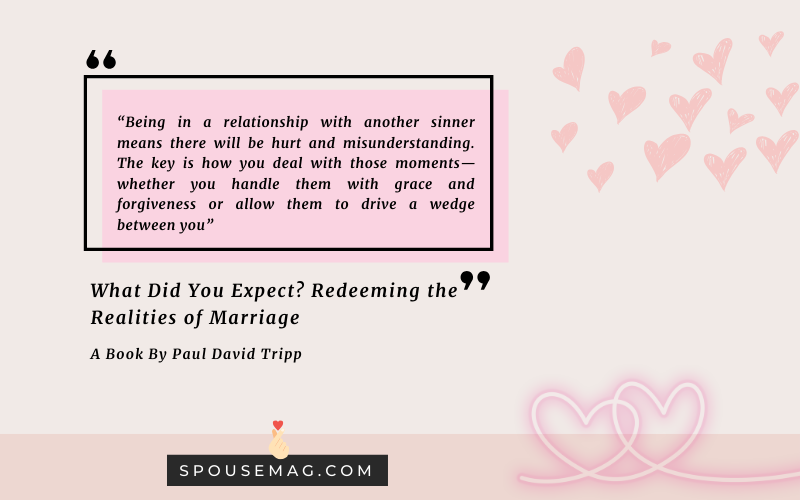
Paul David Tripp’s book, What Did You Expect? is a deep dive into the true essence of marriage as envisioned through a biblical lens.
If you’re seeking to navigate the sometimes rocky terrain of marital life with a fresh perspective, this book provides a wealth of insight grounded in Scripture and real-world application. Here’s a detailed look into the book’s main themes and teachings:
Discovering the Realities of Marriage
I was struck by how Paul David Tripp so candidly addresses the gap between the rosy expectations we often have about marriage and the actual day-to-day realities. It’s like stepping out of a dreamy romance into a real-world experience where two imperfect people are figuring things out together.
Tripp’s insights really hit home—marriage isn’t the fairy tale we imagine; it’s a journey of understanding and adapting to each other’s flaws. This realization is crucial for setting a realistic foundation.
Critique: Reality Check Overload
Some readers felt that Tripp’s straightforward talk about the harsh realities of marriage hit a bit too hard. It’s like getting a reality check all at once, which can be a bit overwhelming. While it’s refreshing to get a dose of honesty, it might feel a bit much for those who want a softer approach to understanding the ups and downs of marriage.

Core Commitments for a Thriving Marriage
Tripp’s five core commitments are like the gold standard for any marriage. Reading through them, I felt a wave of clarity about what makes a relationship truly resilient:
- Regular confession of faults and seeking forgiveness from both God and one’s spouse are vital for healing and growth.
- Couples should view marriage as an opportunity for ongoing personal and relational development.
- Trust must be actively cultivated through honesty and transparency.
- True love involves self-sacrifice and a deep, active commitment to each other’s well-being.
- Embracing and appreciating each other’s differences fosters harmony and prevents conflicts.
Critique: Checklist Fatigue
The five core commitments are super insightful, but some folks felt like they were reading a never-ending checklist. The advice is solid, but the book sometimes makes it feel like you’re being handed a huge to-do list. This can be a bit overwhelming if you’re trying to keep up with all the different commitments at once.
The Essential Role of Grace
Tripp makes it clear that grace isn’t just a nice idea but an essential component of a lasting marriage.
It’s like having a constant source of strength that helps you overlook each other’s flaws and focus on what truly matters. I found this aspect incredibly comforting—knowing that grace can help us navigate even the toughest times.
Critique: Grace Overkill
Tripp talks a lot about grace, which is really important. But for some readers, it felt like the message was repeated so many times that it lost a bit of its punch.
It’s a great concept, but hearing about it over and over might make it feel a bit repetitive, especially if you’re looking for a mix of different solutions.
Prepared Spontaneity in Marriage
The concept of “prepared spontaneity” was both refreshing and practical. It struck me as a beautiful balance between being intentional about your relationship and leaving room for those spontaneous, loving moments.
Tripp’s take made me think about how important it is to plan for love and joy, while also staying open to the unplanned moments that keep the spark alive.
Critique: Theory vs. Reality
Some readers struggled with how to actually make it work in real life.
Figuring out how to balance planning with spontaneous moments can be tricky. The book explains the concept well, but some folks might need more practical tips on how to apply it day-to-day.
Addressing Self-Centeredness and Marital Conflicts
Tripp’s exploration of self-centeredness in marital conflicts was eye-opening. It’s easy to get caught up in personal desires and overlook the broader picture of what’s best for the relationship.
Shifting focus from our little kingdoms to God’s greater kingdom can really help in resolving conflicts and fostering a more harmonious relationship. This was a key takeaway for me, underscoring how important it is to keep a broader perspective on what truly matters.
Critique: One-Dimensional Focus
Tripp’s focus on self-centeredness as the main cause of marital issues is eye-opening, but some readers thought it was a bit narrow. While self-centeredness is definitely a factor, the book doesn’t dive into other possible causes of conflict. It might feel like there’s more to the story that’s not being addressed.
Daily Effort and Continuous Reconciliation
Finally, the book’s focus on daily effort and continuous reconciliation struck a chord. Marriage is a continuous journey rather than a destination. The idea that small, daily actions and ongoing reconciliation are essential for long-term health made me reflect on how little things add up over time.
Even though the book’s repetitive nature and extensive case studies could be a bit overwhelming, the core message was clear and valuable. It’s about commitment, grace, and consistent effort to keep the relationship thriving.
Critique: Repetition Overload
The book really hammers home the idea that marriage requires daily effort and ongoing reconciliation.
While this is totally true, some readers found the repeated emphasis on this point a bit tedious. It’s important advice, but hearing it over and over might make it feel a bit monotonous, especially if you’re looking for a bit more variety in the message.
Who Should Read What Did You Expect?
What did you expect is ideal for:
- Engaged Couples: Get a real look at what marriage involves before tying the knot.
- Married Couples: Gain insights for navigating both new and long-term relationships.
- Christian Readers: Align your marriage with biblical principles.
- Those Seeking a Refresh: Find motivation and tools to revitalize your relationship.
- Counselors and Marriage Coaches: Use as a practical resource for guiding couples.
| Reading Speed | Estimated Reading Time | Goodreads Rating | Amazon Rating |
|---|---|---|---|
| Average (250 words per minute) | ~7-8 hours | 4.18/5 | 4.7/5 |
Readers’ Thoughts About What Did You Expect? Redeeming the Realities of Marriage
An overview of what Goodreads reviewers say about What Did You Expect? Redeeming the Realities of Marriage:
- Readers appreciate the actionable tips and realistic approach to marriage challenges. They find Tripp’s insights on grace, confession, and commitment particularly valuable for everyday marital issues.
- The book’s strong alignment with Christian teachings is praised. This aspect makes it a go-to resource for those looking to integrate their faith into their marital life.
- Some find the content repetitive, with key points being reiterated too often.
- The honest portrayal of marriage helps set practical expectations for couples.
- A few reviewers note that the book is lengthy and dense, which can be overwhelming.
Related Reads to Check Out:
If you liked this book, you will definitely enjoy:
- You and Me Forever: Marriage in Light of Eternity Review
- Never Chase Men Again Review
- The 5 Love Languages: The Secret to Love That Lasts Review
Final Thoughts:
Paul David Tripp’s insights on grace, daily effort, and the core commitments for a solid marriage are definitely eye-opening. However, I found that the book’s heavy focus on faith and God wasn’t exactly what I was looking for.
While the biblical foundation is important, I was hoping for a bit more balance between spiritual advice and practical, everyday tips. If you’re seeking a deeper dive into how faith intersects with marriage, this book delivers.
But if you’re looking for more secular guidance or a mix of different perspectives, it might feel a bit one-dimensional.

As a married wife, founder, and editor of SpouseMag.com – these guides are based on my own personal experiences, observations, research and insights. I am transparent about being inspired by the life and work of the two greatest experts in the relationship space – Dr. John and Julia Gottman, and Harville and Helen. They two are some of the strongest couples, researchers, authors, and counselors when it comes to marriage and relationships. My advice and guides are based on my insights and research, and they are not an alternative to professional advice.


